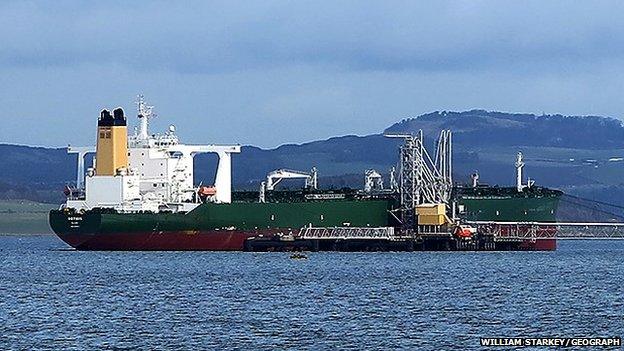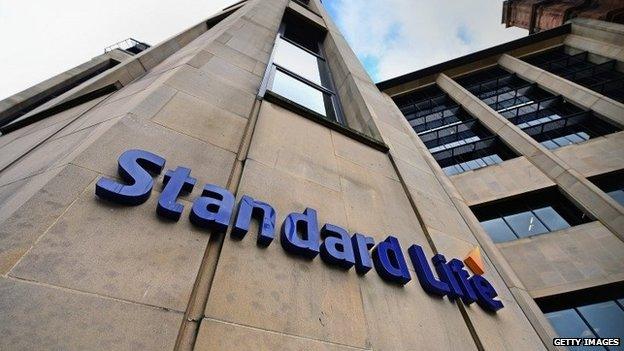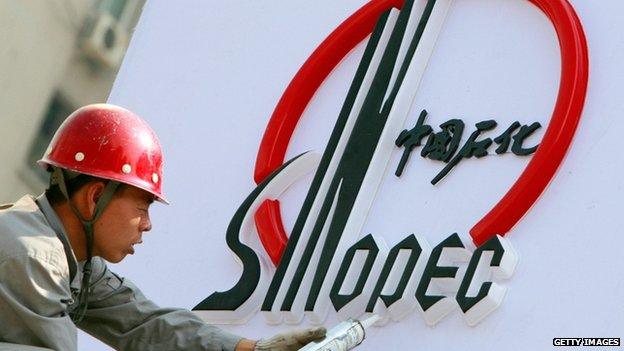Oil turmoil amid Scotland's big players
- Published

We're told SMEs - small and medium-sized enterprises - are the backbone of the Scottish economy. And they are. There are lots of them.
According to the rhetoric, we should support and cherish them, giving the Scottish economy a warm glow.
It's harder to love big corporates, including multi-nationals, where loyalty is to distant, faceless shareholders and is often short-lived. But at this time of year, we get a reminder of the importance of Scotland's biggest 500 companies.
And this year, their profiling highlights how vulnerable the Scottish economy is to (or dependent on) two troubled sectors - banking and offshore oil. It also points to the problems for North Sea oil beginning to set in before the oil price fall.
This is from Scottish Business Insider, where editor Alasdair Northrop and his team pore over the accounts of hundreds of Scottish firms and subsidiaries, turning over more than £20m, to try to tease out revenue, profits and staffing figures.
It's far from easy, as many companies don't give breakdowns of activities in Scotland, or even Britain in some cases. And it means there are significant gaps.

Diageo, for instance, dominates Scotch whisky production, but it's impossible to identify from its accounts what can be attributed to Scotland.
So while French-owned Chivas Brothers comes in at number 12, William Grant's at 14 and Edrington Group at 25, there's no sign of Diageo.
RBS loss
The other hugely distorting factor is banking. Scotland's two giant banks tell very different stories in this year's reckoning. If you include the big profit reported by Lloyds Banking Group, which is registered in Edinburgh, total profits for the 500 firms go up 19%.
But if you then include RBS's giant losses, the total profits of the entire list of 500 firms falls by 38%.
Better, perhaps, to strip both of them out, in which case Alasdair Northrop reports the top 498 companies saw turnover up 8.5% in accounts filed last year, to £164bn, a 1.9% growth in employees to 573,000, but a 10.3% fall in total profits to £8.87bn. Profits per employee were down 12%, to average £15,471.
What can you take from the patterns in this ranking? One factor is that, with or without the two big banks, finance is still an important performer.
Standard Life remains in the number one position, with £22.9bn turnover and £915m pre-tax profits.

Bank of Scotland's profits have catapulted it into the number two position for 2014, up from number 290.
Scottish Widows is at number four (it's also part of Lloyds Banking Group), and Aberdeen Asset Management at 11. Aegon UK and Tesco Bank are also in the top 25.
Profits flow overseas
But this year, it's probably the oil sector that's worth watching most closely. Because of the scale required in offshore oil, it tends to have bigger companies than, say, the hospitality industry, and that's reflected in this listing.
You also find the international ownership is more prominent, with the top-rated companies repatriating their profits out of Scotland - Total Upstream UK is at number five, with turnover of £1.7bn and profits up nearly 50% to £602m. It's owned by the French government.
Also in the top 25 are Chevron and Apache, both headquartered in the US, Taqa Bratani, owned by the Abu Dhabi state, and Dana Petroleum, bought by the South Korean state energy company. Enquest is the only Scots-headquartered oil producer in that rank.
The oil services sector includes Scots-based companies Wood Group, Weir Group and Global Energy. The first two have much of their activity outside Scotland: Global is less global.
Also supplying the offshore industry - both wind arrays and oil installations - was Burntisland Fabricators, the highest riser in the 500 and Scottish-owned - up from number 444 to 130 as it nearly doubled its turnover to £140m.
However, in the top 50, there are rather more company subsidiaries with headquarters elsewhere - GE Oil & Gas, Maersk, Petrofac, Aker Solutions, Halliburton, National Oilwell Varco, Bibby Offshore and energy data analyst Wood Mackenzie.
Drillers down
Taken together, the oil services firms in the Insider 500 saw turnover up 12%, reflecting record levels of investment in UK waters in 2013, much of that continuing into last year.
But for the oil explorers and producers, it was down 8%. That was before the oil price fall began to hit the bottom line. It is more likely to reflect the problems of falling production as companies faced disruption through unplanned maintenance to platforms.
Chevron UK moved from the number five to number eight slot, with profits dropping from £880m to £622m and turnover down from £1.47bn to £1.17bn.

Talisman Sinopec UK - a joint venture between Canadian and Chinese state ownership - saw losses of £1.26bn due to extended maintenance problems, and impairments on its assets.
It went through a major restructuring and management change, the Canadian co-owner was bought by Spain's Repsol last month, and as a signal of the direction of travel throughout the sector, the joint venture has just cancelled a two-year drilling rig contract for the Montrose field, at considerable cost.
Another example of the production problems was in accounts for CNR International, with a £156m loss.
Cash flow
Looking beyond the Insider 500 and coming up to date, the latest analysis from Wood Mackenzie shows that UK oil and gas fields are among the first to become unprofitable as the oil price has fallen.
Assessing 2,222 fields around the world, at $50 per barrel of Brent crude, it is reckoned that 190,000 barrels per day become cash negative. That affects 17 countries, led by the UK and US, say experts at the Edinburgh firm.
If the oil price continues to fall to $40, 1.5m barrels per day deliver less cash than it costs to pump them, bringing in more US conventional production and the tar sands of Canada.
That doesn't mean fields will automatically be closed, says WoodMac's Robert Plummer.
"The first response is usually to store oil produced in the hope that the oil can be sold when the price recovers. For others the decision to halt production is complex and raises further issues," he explains.
"Thus, there is no guarantee these volumes would be shut-in. Operators may prefer to continue producing oil at a loss rather than stop production - especially for large projects such as oil sands and mature fields in the North Sea."
In other words, operators may be willing to keep pumping and take losses if they expect the price to rise again. In that case, the expectations of the future oil price becomes a bigger issue than its current position.
Sparky starts
While talking big corporates, let's not forget the growth of some of Scotland's smallest companies, where there's a bundle of energy.
The Entrepreneurial Spark project, in Ayrshire, Edinburgh and Glasgow, is never short of enthusiasm, and it's just trumpeted the growth of its fledglings and proteges with an update on 2014.
It showed 86% of them have survived. With 350 having been through the 'hatchery', that's a very high hit rate, and reflects on the value of expert and peer group support. "Go do," as they like to say, with evangelical entrepreneurial zeal.
Or, as they were told at the end of their awards dinner on Friday night:
"Here's to the crazy ones, the misfits, the rebels, the ones who see things differently. They're not fond of rules.
"You can quote them, disagree with them, glorify or vilify them. But the only thing you can't do is ignore them, because they change things.
"And while some may seem them as the crazy ones, we see genius - because the ones who are crazy enough to think that they can change the world are the ones who do".
Well, amen to that.